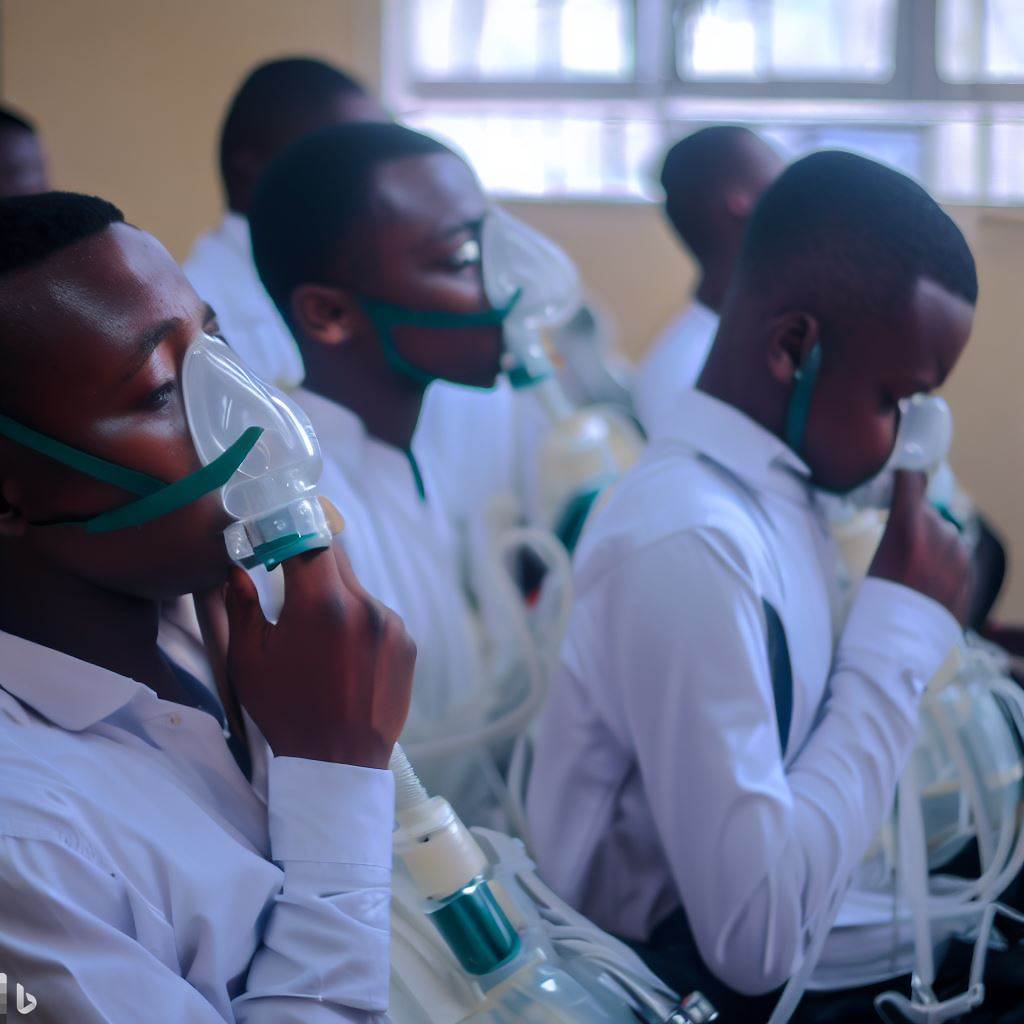Introduction
Respiratory therapists play a crucial role in healthcare, providing essential treatment and care for patients with respiratory conditions.
Their expertise is vital in improving lung function and overall well-being.
To become a respiratory therapist, individuals must undergo specialized education and training.
This typically includes completing a formal accredited program, which may lead to an associate or bachelor’s degree.
The curriculum covers essential topics such as anatomy, physiology, pharmacology, and respiratory therapy techniques.
Once qualified, respiratory therapists work in various healthcare settings, including hospitals, clinics, and home care.
They collaborate with physicians to develop and implement treatment plans, which may include administering medications, managing ventilators, and conducting diagnostic tests.
Respiratory therapists also educate patients on managing respiratory conditions and adopting healthier lifestyle choices.
Their dedication and expertise contribute significantly to improving the quality of life for individuals suffering from respiratory ailments.
Overview of Nigerian Universities
Brief introduction to the education system in Nigeria
In Nigeria, the education system consists of primary, secondary, and tertiary levels, with tertiary education being provided by universities, polytechnics, and colleges of education.
Top universities offering respiratory therapy programs
Nigerian universities are known for their diverse academic offerings and high-quality education programs.
When it comes to respiratory therapy programs, there are several top universities in Nigeria that offer quality education in this field.
These universities provide both theoretical knowledge and practical training to ensure that students are well-prepared for their future careers as respiratory therapists.
Below is a list of some of the top Nigerian universities offering respiratory therapy programs:
- University of Lagos (UNILAG): UNILAG is one of the oldest and most prestigious universities in Nigeria.
It offers a Bachelor of Science (B.Sc.) degree in Respiratory Therapy, providing students with the necessary skills and knowledge to diagnose and treat respiratory illnesses. - Obafemi Awolowo University (OAU): OAU is renowned for its medical programs, including respiratory therapy.
The university offers a Bachelor of Medical Rehabilitation in Respiratory Therapy, equipping students with the essential skills to work as respiratory therapists in various healthcare settings. - University of Benin (UNIBEN): UNIBEN offers a Bachelor of Science (B.Sc.) in Respiratory Therapy, providing students with a comprehensive understanding of respiratory care.
The program combines theory, hands-on training, and clinical rotations to ensure students are well-prepared for their future profession. - Ahmadu Bello University (ABU): ABU offers a Bachelor of Science (B.Sc.) in Respiratory Therapy, focusing on the prevention, diagnosis, and treatment of respiratory illnesses.
The program emphasizes practical training to equip students with the necessary skills to excel in their careers. - Lagos State University (LASU): LASU offers a Bachelor of Science (B.Sc.) degree in Respiratory Therapy, providing students with a strong foundation in the field. The program emphasizes hands-on training and clinical exposure, ensuring that graduates are well-prepared for the demands of the profession.
These universities not only offer quality respiratory therapy programs but also provide students with access to state-of-the-art facilities and experienced faculty members who are experts in the field.
Students also have the opportunity to participate in research projects and internships, further enhancing their learning experience.
Generally, Nigerian universities offer excellent respiratory therapy programs that provide students with the necessary skills and knowledge to become successful respiratory therapists.
Curriculum and Admission Requirements
Respiratory therapy program curriculum
- Introduction to Respiratory Therapy: Provides an overview of the field and its importance.
- Basic Sciences: Covers anatomy, physiology, and pathology related to the respiratory system.
- Respiratory Pharmacology: Focuses on medication used in the treatment of respiratory disorders.
- Respiratory Assessment and Diagnosis: Teaches techniques for evaluating respiratory function and diagnosing diseases.
- Respiratory Therapeutics: Explores various therapeutic interventions and techniques used in respiratory care.
- Pulmonary Rehabilitation: Covers techniques and strategies for improving lung function and managing chronic respiratory diseases.
- Respiratory Care in Special Populations: Examines respiratory care for neonatal, pediatric, and geriatric patients.
- Respiratory Emergency Management: Provides training in handling respiratory emergencies and resuscitation procedures.
- Advanced Respiratory Techniques: Explores specialized techniques such as mechanical ventilation and pulmonary function testing.
Emphasis on practical training and theoretical knowledge
The respiratory therapy program in Nigerian universities places a strong emphasis on practical training.
Students are required to complete clinical rotations in hospitals and healthcare facilities.
This hands-on experience allows them to apply their theoretical knowledge in real-world scenarios and develop critical skills in patient care.
Admission requirements
- Academic qualifications: Prospective students must have a high school diploma or its equivalent.
- Entrance exams: Candidates are required to take and pass the university’s entrance examination.
- Minimum grade point average: A certain minimum GPA, typically set by the university, is required for admission.
- Science prerequisites: Students must have completed courses in biology, chemistry, and physics.
- Personal statement: Applicants may need to write a personal statement highlighting their interest in respiratory therapy and career goals.
- Letters of recommendation: Some universities may require letters of recommendation from teachers or professionals in the field.
To sum it up, the respiratory therapy program in Nigerian universities has a comprehensive curriculum that combines theoretical knowledge with practical training.
Students gain a deep understanding of respiratory care through courses covering various aspects of the field.
Admission to the program requires meeting academic qualifications, passing entrance exams, and fulfilling specific prerequisites.
By ensuring a strong foundation in respiratory therapy education, these universities prepare students to become competent and skilled respiratory therapists.
Read: Demystifying Myths Around the Respiratory Therapy Profession in Nigeria

Faculty and Resources
In order to provide quality education in respiratory therapy, Nigerian universities have highly qualified faculty members.
- The faculty members of respiratory therapy programs in Nigerian universities possess relevant qualifications and expertise.
- They hold advanced degrees in the field of respiratory therapy and have practical experience.
- These faculty members have a deep understanding of the complexities and challenges that respiratory therapists face.
- They are dedicated to imparting their knowledge and skills to the students.
Specialized resources available for respiratory therapy education
Furthermore, Nigerian universities also provide specialized resources to enhance respiratory therapy education:
- State-of-the-art laboratories equipped with modern technology and equipment for hands-on training.
- Simulation centers that allow students to practice their skills in a controlled environment.
- Access to relevant research journals and publications to keep students updated with the latest advancements in the field.
- Collaborations with healthcare facilities for clinical rotations, providing real-life experiences to students.
The availability of these resources ensures that students receive comprehensive and practical education in respiratory therapy.
Additionally, the faculty-to-student ratio plays a crucial role in effective learning:
- Having a low faculty-to-student ratio allows for personalized attention and interaction between faculty members and students.
- This creates a conducive learning environment and fosters mentorship opportunities.
- Students can seek guidance from experienced faculty members, resulting in better understanding and skill development.
- Faculty members can closely monitor the progress of each student and provide timely feedback for improvement.
Furthermore, a low faculty-to-student ratio enables faculty members to accommodate different learning styles and cater to individual needs.
In fact, Nigerian universities prioritize the qualifications and expertise of faculty members in respiratory therapy education.
They provide specialized resources such as laboratories, simulation centers, and access to research materials.
The faculty-to-student ratio is also maintained at a level that promotes effective learning and personalized attention.
These factors contribute to the overall quality of education in respiratory therapy and produce competent professionals in the field.
Read: Advancements in Speech-Language Pathology: The Nigerian Scene
Clinical Training Opportunities
Overview of Clinical Training Affiliations
One of the essential components of respiratory therapist education in Nigerian universities is clinical training.
These universities have established affiliations with numerous hospitals and healthcare facilities across the country.
These partnerships provide students with the opportunity to apply their theoretical knowledge in real-life settings.
The clinical training affiliations offer a variety of healthcare settings for students to gain practical experience.
Students may be assigned to teaching hospitals, private hospitals, community health centers, or specialized facilities such as respiratory therapy departments.
These diverse training opportunities expose students to various patients, conditions, and treatment methods.
Importance of Hands-on Experience
Hands-on experience plays a vital role in the development of respiratory therapy skills.
While theoretical knowledge is fundamental, it is through practical applications that students truly grasp the intricacies of their profession.
Clinical training allows students to put their theoretical knowledge into action and develop essential skills such as patient assessment, diagnostic techniques, and treatment implementation.
Furthermore, working directly with patients under the supervision of experienced respiratory therapists enhances students’ confidence and increases their competence.
They learn to communicate effectively with patients, make critical decisions, and adapt to the dynamic nature of healthcare environments.
Read: Top Institutions to Study Phlebotomy in Nigeria
Examples of Real-Life Scenarios
During clinical rotations, respiratory therapy students encounter a wide range of real-life scenarios.
This exposure enables them to gain insights into the challenges, complexities, and rewards of their future profession.
For instance, students may assist in treating patients with respiratory disorders such as asthma, COPD, or pneumonia.
They observe and participate in administering oxygen therapy, bronchodilators, and other respiratory interventions.
Through these experiences, students learn to assess patients’ conditions, interpret diagnostic tests, and adjust treatment plans accordingly.
Students also witness the critical role of teamwork in healthcare settings.
They collaborate with nurses, physicians, and other healthcare professionals to provide comprehensive and coordinated care to patients.
This interprofessional collaboration fosters mutual respect, effective communication, and a holistic approach to patient care.
Furthermore, students may encounter emergency situations where quick thinking and immediate intervention are crucial.
They learn to respond effectively to respiratory crises, perform CPR, and assist with intubations or tracheostomies.
These scenarios simulate the intense, high-pressure nature of the respiratory therapy field and prepare students for emergencies they may face in their future careers.
Clinical training opportunities are invaluable for respiratory therapy students in Nigerian universities.
These affiliations with hospitals and healthcare facilities provide hands-on experience, allowing students to develop crucial skills and encounter real-life scenarios.
Through these experiences, students are better prepared to become competent and compassionate respiratory therapists who can positively impact patients’ lives.
Read: The Salary Structure of Speech-Language Pathologists in Nigeria
Challenges and Solutions
Respiratory Therapist Education in Nigerian universities faces diverse limitations, necessitating strategic improvements.
Key challenges and corresponding solutions are as follows:
- Limited resources: Seeking financial aid from governmental and non-governmental organizations and forming partnerships with healthcare institutions and sponsors can address funding and resource inadequacies
. - Inadequate faculty: Recruiting qualified foreign respiratory therapists temporarily and offering continuous professional development programs can alleviate faculty shortages.
- Curriculum development: Regularly reviewing and updating the curriculum in line with industry advancements and providing increased clinical exposure through simulation labs can enhance the program.
- Limited clinical placement opportunities: Building strong relationships with healthcare facilities and utilizing telehealth platforms for virtual clinical experiences can expand placement options.
- Public perception and awareness: Raising awareness about respiratory therapy through media campaigns, workshops, and outreach programs will promote the field.
- Accreditation and certification: Seeking international accreditation and collaborating with professional organizations can establish certification standards.
- Research and innovation: Encouraging a research culture and collaborating with research institutions will foster innovative practices in respiratory therapy education.
By addressing these challenges, Nigerian universities can uplift Respiratory Therapist Education, producing competent professionals who contribute effectively to the healthcare system.
Collaboration among universities, government bodies, and healthcare organizations is crucial for program improvement.
Read: Interview Tips for Aspiring Respiratory Therapists in Nigeria
Graduation Prospects and Career Opportunities
As Nigerian universities continue to offer respiratory therapy programs, it is essential to discuss the job prospects that await graduates.
With the growing awareness of the importance of respiratory health, the demand for respiratory therapy professionals in Nigeria is on the rise.
List of job prospects for respiratory therapy graduates in Nigeria
- Respiratory Therapist in Hospitals: Graduates can work in hospitals, providing respiratory care to patients with various respiratory conditions.
- Pulmonary Rehabilitation Specialist: Graduates can specialize in pulmonary rehabilitation and assist patients in recovering lung function.
- Intensive Care Unit (ICU) Therapist: Respiratory therapists can work in ICUs, managing ventilators and providing critical care to patients.
- Sleep Disorder Specialist: Graduates can focus on sleep disorders and help diagnose and treat conditions like sleep apnea.
These are just a few examples of the diverse career options available to respiratory therapy graduates in Nigeria.
The field offers opportunities for specialization and growth.
Read: How to Become a Diagnostic Medical Sonographer in Nigeria
Pursuing Further Specialization and Postgraduate Opportunities
After completing a bachelor’s degree in respiratory therapy, graduates can choose to pursue further specialization and postgraduate studies.
List of further specialization and postgraduate opportunities:
- Master’s Degree in Respiratory Therapy: Graduates can opt for a master’s degree program to enhance their knowledge and expertise in the field.
- Doctorate in Respiratory Therapy: For those interested in research and academia, a doctorate in respiratory therapy allows for advanced study and specialization.
- Certificate Programs: Graduates can enroll in certificate programs to gain additional skills in areas such as sleep medicine or neonatal/pediatric respiratory care.
Pursuing further education not only expands career opportunities but also allows graduates to contribute to the advancement of respiratory therapy as a discipline in Nigeria.
In short, respiratory therapy graduates from Nigerian universities have promising job prospects in various healthcare settings.
The demand for their expertise continues to grow, creating opportunities for career advancement and specialization.
By pursuing further education, graduates can enhance their skills and contribute to the development of respiratory therapy in Nigeria.
Read: How to Become a Medical Lab Technician in Nigeria
Conclusion
Respiratory therapy plays a vital role in healthcare as it helps in treating and managing respiratory conditions. It is an essential profession in Nigeria’s healthcare system.
There are several Nigerian universities that offer respiratory therapy education, including the University of Lagos, Ahmadu Bello University, and Obafemi Awolowo University.
These universities provide quality education and training for aspiring respiratory therapists.
If you are an aspiring respiratory therapist, I encourage you to pursue your career in Nigeria.
The country offers opportunities for growth and development in this field.
By choosing this path, you can make a significant impact on the lives of many Nigerians and contribute to the improvement of respiratory health in the country.
Respiratory therapy is a rewarding profession that allows you to directly help patients breathe easier and improve their quality of life.
It is a field that continues to evolve, offering exciting prospects for those interested in this area of healthcare.
So, if you have the passion and determination to become a respiratory therapist, take the necessary steps to fulfill your dream.
Explore the educational opportunities available in Nigerian universities and embark on a fulfilling career in respiratory therapy.
Remember, your role as a respiratory therapist is invaluable, and with the right education and training, you can make a significant impact in the healthcare industry in Nigeria.




